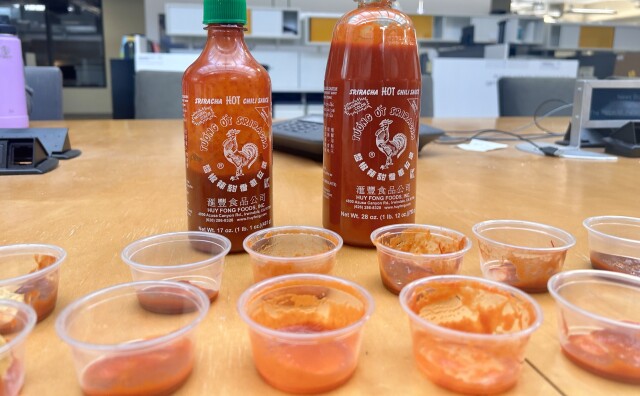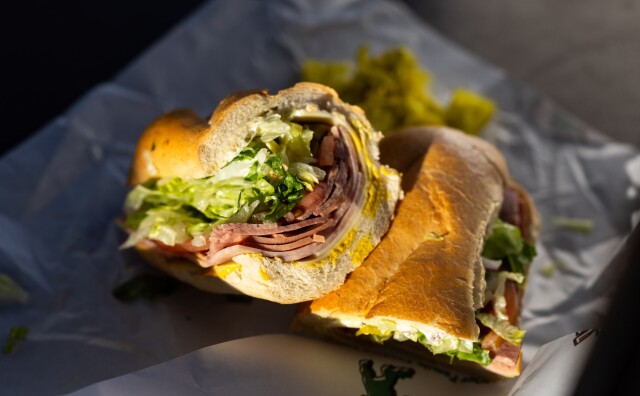Street Food Vendors Face A Months-Long Struggle To Get Vaccinated

For the past year, street food vendors have struggled to find a balance between safety and survival, working a job where they have no choice but to interact with people. Although Los Angeles County food and agricultural workers have been eligible to get the COVID-19 vaccine since March 1, what they're allowed to do and what they're able to do are often worlds apart. For many street vendors, getting vaccinated is proving to be an insurmountable hurdle. They face language barriers, lack of required documentation and a dearth of convenient appointments.

LANGUAGE BARRIERS
For some street food vendors, who are only fluent in Spanish (or another language), becoming eligible for the vaccine was just the first step. They still have to navigate an appointment process they often don't understand.
Gabino, who asked that we not use his last name because he doesn't have a license for his utility cart and portable drink cooler, recently started selling tacos and esquites in MacArthur Park. He would love to get vaccinated. "I'm 50 years old and have diabetes so it definitely would help me feel safer while I work," Gabino says.
He doesn't have a computer or broadband internet so his cell phone is his only way of making an appointment. He has tried calling L.A. County's dedicated number for vaccine appointments several times. "I have tried calling to set up a vaccination appointment but I have not been able to as of yet," Gabino says.
He typically calls the appointment hotline once a day but his social anxiety makes each call difficult. He doesn't speak much English so each time, he waits for someone to answer, hoping they speak Spanish. Like many other non-English-speakers, Gabino worries he may not be able to communicate properly with whoever answers his call.
Hold times are long. Every time he has called, the automatic message notifies him that the county is dealing with a high volume of calls. He typically waits for a while but the process is discouraging and he eventually hangs up.
"For the longest time, I did not know if I was eligible for the vaccine, so when I first started calling [in March,] I had no idea if it was worth waiting a really long time to get my call answered," Gabino says.
Gabino, who lost his job cleaning offices in Long Beach 10 months ago, only joined the street food game in early March.
"I have to say that street vending has been just as fruitful. I work closer to home and the park tends to be busy on the weekend, which is why I often come here to make some money," Gabino says. But more people means more risk.
On a recent Saturday, MacArthur Park was bustling. Kids ran around the playground, elderly couples watched ducks by the pond and a community of unhoused people sat together on the grass while maskless preachers shouted about salvation through microphones.
The Westlake neighborhood has seen nearly 7,645 COVID-19 cases, meaning approximately 6% of its residents have tested positive for the virus, a similar rate to many other Los Angeles neighborhoods. But in late March, L.A. County reported that the population of unhoused people in MacArthur Park suffered a COVID-19 outbreak leading to 15 infections and 1 death.
Street food vendors, like Gabino, who interact with the general public are in a vulnerable position. As a diabetic, he knows that every day without the COVID-19 vaccine, he's rolling the dice. But what else can he do?
"I just wish the government did more to help me, not just with the vaccine but also by getting police officers to stop the fines on unlicensed vendors," he says.

NO DOCUMENTATION? NO SERVICE
To get a COVID-19 vaccine in Los Angeles County, food and agriculture workers must present three things: a photo ID, proof they work in the food industry and proof they live or work in L.A. County (if their other documents don't include a home or work address).
That's not an easy ask for many of the DIY taqueros, eloteros, tamaleros and marisqueros who have shaped L.A.'s street food scene.
"I have no papers so my line of work puts me in a tough situation," says Ramiro, an undocumented and unlicensed vendor who sells raspados and elote from a cart in Bell Gardens. (He also asked that we not use his last name to protect his identity.)
The only document preventing Ramiro from getting vaccinated is proof that he works in the food industry. He is his own employer and he doesn't have a license from City Hall, so what evidence can he show?
This may not be an issue for vendors with licenses but they're in the minority. Unlicensed street food vendors make up the vast majority of L.A. County's approximately 10,000 street food vendors.
"This economy is rough. I went from doing this as a temporary job to doing this full time since it helps pay the bills. Not sure when this will end, particularly for workers like me where vaccines are just not available to us," Ramiro says.
"A lot of the Spanish-speaking street vendors we work with have trouble getting access to the vaccine," says Rudy Espinoza, Executive Director for Inclusive Action for the City, an organization that advocates for street vendors and looks to legitimize their work across Los Angeles. "These community members have already been left behind for so long, so they need a lot more resources now to catch up with everyone else."
Like most street food vendors, licensed or not, Ramiro wakes up early. At 5 a.m., he heads to Treto's, a wholesale produce market in DTLA where he buys fresh corn. While he sorts through the corn, tossing any cobs that are bruised or moldy, his wife makes the 11 syrups that flavor his raspados. (Mango and guava are the most popular.) Ramiro then heads out with his cart, going block-to-block looking for customers.
Ramiro does his best to keep himself and his customers safe. He wears a mask. He brings copious hand sanitizer. He prepares everything while wearing gloves. He has customers drop their money in a bucket instead of handing it to him. These safety precautions have kept him healthy but business is still slow. Before the pandemic, he typically earned $200 per day. Now, he feels lucky to make $100.
"Most of my money came from selling to local factory workers but most [of them] aren't really comfortable coming up to me," Ramiro says.
Not being able to meet the documentation requirement to get a COVID=19 vaccine has been frustrating, since it's the only thing separating him and his licensed colleagues.
"For workers like us, without any papers, there are no vaccines," Ramiro says. "I call and check online and there is just nothing being offered to us."

JUGGLING APPOINTMENTS AND EMPLOYMENT
Working six or seven days a week, a typical schedule, has made it hard for many street and mobile food vendors to get inoculated.
"My work day is, honestly, never ending," says John Ou, who owns burger truck The Fix On Wheels. "I wake up at 5:30 a.m. At 7:38 a.m., I get to Restaurant Depot to stock up for my first stop of the day. By 10 a.m., I arrive at my first spot and stay there for lunch hours. Following that, I refuel and restock for dinner. By the evening, I'm at my dinner area."
Ou does this six days a week, every week. When he tried to set up an appointment on his day off, which is usually Monday, he had trouble finding available time slots.
Even with help from Matt Geller, who runs the Southern California Mobile Food Vendors Association, it didn't make much of a difference. California's MyTurn vaccine scheduling site had no available appointments for weeks when he checked the site.
"Most vendors I work with have been complaining," Geller says. "I do my best to help them set appointments because these are some busy people and they can't always be refreshing the MyTurn website."
Justin Tulus (left) prepares food for customers as Tom Tulus (right) takes customer's order at their truck StopBye Cafe on March 28, 2021. (Manuel Valladares/LAist)
Like many other mobile truck operators and street food sellers, Ou has had no choice but to continue working during the pandemic, even as sales plummeted. In the past year, he says he has seen roughly two-thirds of his fellow food truck operators park their vehicles for good.

At Asian fusion truck StopBye Cafe, business has dropped 80% in the past year. Co-founders Justin and Tom Tulus say they've managed to survive because family members stepped in, helping them prepare and serve their fried chicken and garlic noodles.
After a week of trying, the brothers finally received their vaccines on March 8. "It took us a week to find an appointment and we had to drive from central L.A. to Pomona but we did it. We are hoping that we can get our other family members vaccinated soon," Justin Tulus says.
These aren't nebulous concerns. Food trucks are, by design, cramped spaces. COVID-19 outbreaks, when they happen, can spread quickly among the people who work in them.
"I know of two food truck owners who had some real established businesses, who died of COVID-19. From my knowledge, nobody else tested positive but the fear that they could is valid," Ou says.
Street vendors were already vying for appointments with other essential workers and vulnerable populations. Now that COVID-19 vaccine access is open to any California resident who is at least 16 years old, they'll be competing for appointments against an even larger group of people.
The Tulus brothers managed to get fully vaccinated at the end of March. Now, they're waiting and hoping that as more of their customers get vaccinated, their sales will start ticking upwards.
"We used to serve food by the Anime Expo and that would have about 100,000 people per day," Justin Tulus says. "We won't see that this year but hopefully, we do in the future. [That's why] it's important for everyone in the U.S. to get vaccinated at this point, so we can all go back to normal."
-
After people began complaining online that Sriracha they'd bought recently didn't taste like the old stuff, we set out to find the answer. It didn't go well.
-
From tortas to tuna melts, all sandwiches tell a unique story as they celebrate Los Angeles' diverse tapestry of flavors with each bite.
-
The company behind Sriracha told us production has resumed.
-
Dustin Bartz has figured out a way to sell a $6 smashburger — and still make a tidy profit. He enjoys trolling competitors who charge more.
-
Two amateur bakers take on a beloved, almost sacrosanct school treasure.
-
For Jeff Alulis, the Burger Quest became “something bigger” than him.






